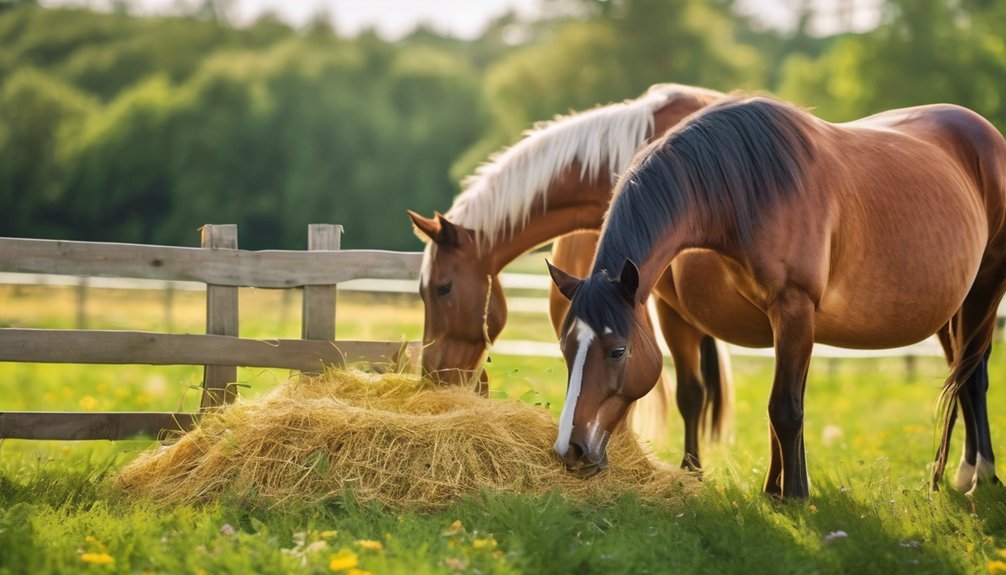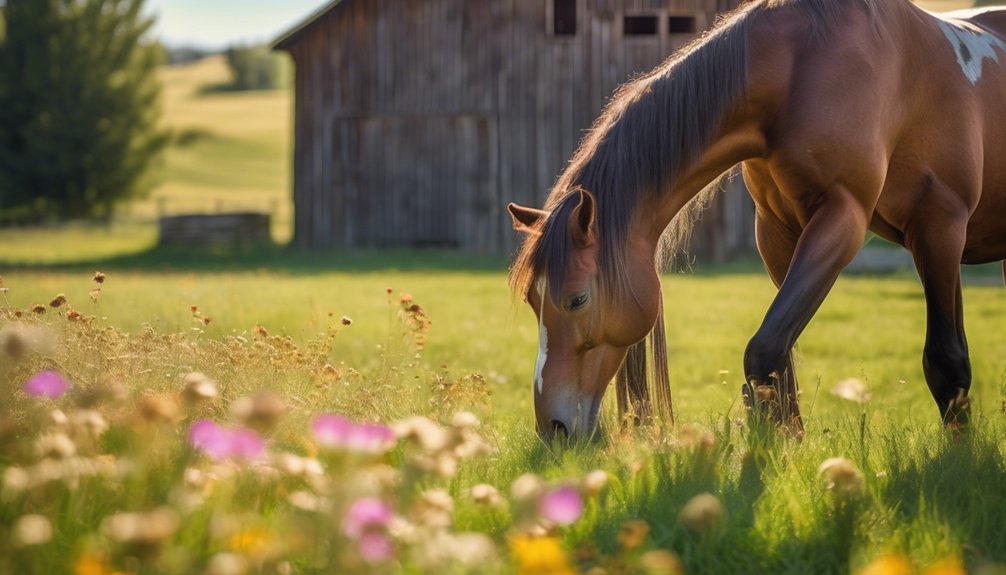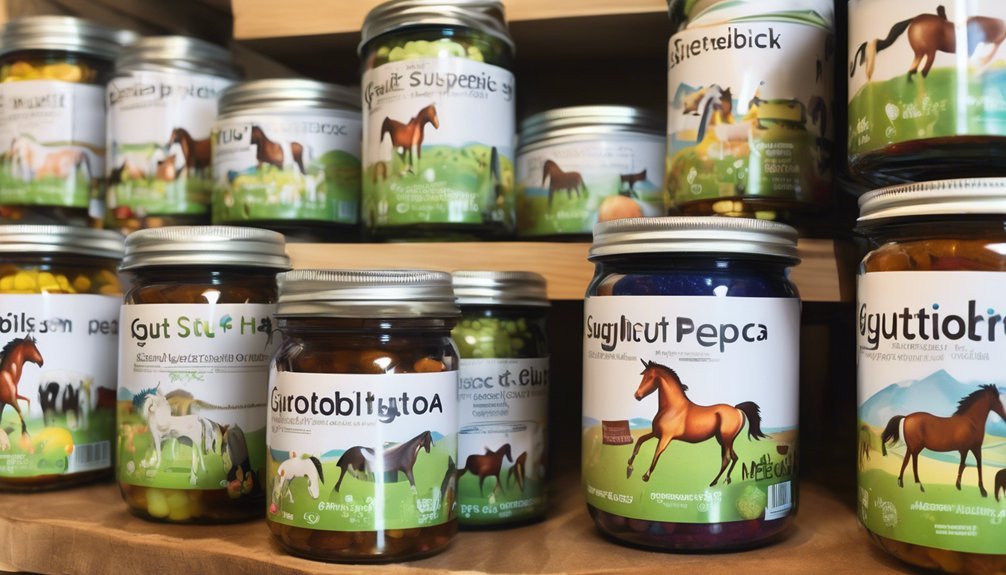
Understanding the role of prebiotics and probiotics in horse health is crucial for optimizing digestive function. These compounds work synergistically to enhance gut flora and nutrient absorption. By focusing on these elements, you can significantly impact your horse's overall well-being. However, recognizing the specific benefits and how to implement them in your horse's diet requires further exploration. What factors should you consider to ensure your horse thrives?
Key Takeaways
- Prebiotics feed beneficial gut bacteria, enhancing digestion and nutrient absorption in horses.
- Probiotics introduce live microorganisms that help maintain a balanced gut microbiome.
- A healthy gut microbiome improves immune function and resilience against infections.
- Regular use of prebiotics and probiotics supports recovery during stress and enhances overall well-being.
- Incorporating these elements fosters optimal digestive health, contributing to horse performance and vitality.
What Are Prebiotics and Probiotics?

When you think about maintaining your horse's gut health, understanding prebiotics and probiotics is essential.
Prebiotics are non-digestible fibers that serve as food for beneficial gut bacteria, promoting their growth. Common prebiotic sources include chicory root and beet pulp, which help nourish your horse's microbiome.
On the other hand, probiotics are live microorganisms that provide health benefits when consumed in adequate amounts. Various probiotic types exist, such as Lactobacillus and Bifidobacterium, each playing a unique role in enhancing digestive health.
By incorporating both prebiotics and probiotics into your horse's diet, you're fostering a balanced gut environment that supports optimal digestion and overall well-being.
Understanding these components empowers you to make informed choices for your horse's health journey.
The Importance of Gut Health in Horses
Gut health is crucial for your horse's overall well-being, as it directly impacts digestion, nutrient absorption, and immune function.
The gut microbiome plays a significant role in maintaining this health, as it consists of trillions of microorganisms that help break down food and produce essential nutrients.
When your horse's gut microbiome is balanced, it enhances the production of digestive enzymes, improving the efficiency of nutrient absorption.
Conversely, an imbalance can lead to digestive issues, reduced immunity, and poor performance.
By prioritizing gut health, you not only support your horse's digestive system but also contribute to its overall vitality.
Understanding and fostering a healthy gut microbiome is essential for ensuring your horse thrives throughout its life.
How Prebiotics Support Equine Digestive Health

Prebiotics play a vital role in enhancing equine digestive health by nourishing the beneficial bacteria in your horse's gut.
By promoting a healthy microbial balance, prebiotics help optimize digestive enzymes, ensuring your horse can effectively break down nutrients.
Consider these prebiotic sources for your horse's diet:
- Chicory root
- Beet pulp
- Fructooligosaccharides (FOS)
- Inulin
- Mos (mannan-oligosaccharides)
Incorporating these sources not only supports gut flora but also aids in nutrient absorption, leading to improved overall health.
When you prioritize prebiotics, you're actively fostering a thriving environment for your horse's digestive system, which can enhance performance and well-being.
Understanding the significance of prebiotics empowers you to make informed choices for your horse's nutritional needs.
The Role of Probiotics in Horse Nutrition
Probiotics play a crucial role in maintaining a balanced equine digestive system, as they introduce live beneficial microorganisms that can positively influence gut health.
By incorporating various probiotic sources such as fermented feeds and supplements into your horse's diet, you can enhance their digestive microbiome. This improved balance supports nutrient absorption and helps prevent digestive disturbances.
Probiotics work by outcompeting harmful bacteria, thereby fostering a healthier gut environment. Regular administration can also aid recovery during stressful situations, like changes in diet or travel.
Understanding the importance of these microorganisms is vital for optimizing your horse's nutrition and overall well-being. By prioritizing probiotics, you're investing in a healthier, happier horse.
Benefits of Prebiotics and Probiotics for Horse Immunity

When horses maintain a balanced gut microbiome, their immune systems benefit significantly. Prebiotics and probiotics play a crucial role in enhancing their immune response by promoting gut health.
A thriving microbiome helps regulate inflammation and supports the production of beneficial metabolites, ultimately fortifying your horse's defenses against pathogens.
Consider these key benefits:
- Strengthened immune response
- Enhanced nutrient absorption
- Reduced inflammation
- Better overall health
- Improved resilience to infections
Incorporating prebiotics and probiotics into your horse's diet isn't just about digestion; it's an investment in their overall immunity.
Signs of Digestive Imbalance in Horses
Digestive imbalances in horses can manifest in various ways, often signaling underlying issues within the gut microbiome.
You might notice digestive symptoms such as bloating, diarrhea, or changes in appetite, all indicating that your horse's gut isn't functioning optimally. These signs can reflect poor nutrient absorption, leading to deficiencies that affect overall health and performance.
Additionally, behavioral changes like irritability or lethargy may arise as discomfort increases. It's crucial to monitor your horse closely, as these imbalances could also predispose them to more serious conditions.
Keeping an eye on their manure consistency and appetite can provide valuable insights into their digestive health, allowing you to take proactive measures when necessary. Understanding these signs is essential for maintaining your horse's well-being.
How to Choose the Right Prebiotic and Probiotic Products

How do you determine which prebiotic and probiotic products are best suited for your horse? Start by focusing on a few key factors to ensure effective product selection:
- Ingredient evaluation: Look for well-researched ingredients that support gut health.
- Dosage recommendations: Check if the product provides clear dosage instructions based on your horse's weight.
- Brand comparison: Research reputable brands with positive reviews and transparency regarding their formulations.
- Targeted benefits: Consider products that address specific digestive issues your horse may face.
- Veterinary advice: Consult your veterinarian for personalized recommendations tailored to your horse's unique needs.
Incorporating Prebiotics and Probiotics Into Your Horse's Diet
Incorporating prebiotics and probiotics into your horse's diet can significantly enhance their gut health and overall well-being, especially if you follow a structured approach.
Begin by evaluating dietary sources, such as fiber-rich forage, which naturally contains prebiotics. You can also consider specific feeds designed for gut health that include probiotics.
For supplementation methods, select high-quality products that specify the strains and amounts of live microorganisms. Gradually introduce these components to avoid digestive upset, monitoring your horse for any changes in behavior or health.
Consistency is key; aim for daily inclusion in their feed. By doing this, you'll foster a balanced gut microbiome, promoting better digestion and nutrient absorption, ultimately supporting your horse's vitality and performance.
The Future of Gut Health Research in Equine Health

As horse owners increasingly recognize the importance of gut health, research in equine probiotics and prebiotics is evolving rapidly.
The future of gut health research focuses on understanding the gut microbiome evolution in horses and developing innovative future therapies. You can expect:
- Advanced sequencing techniques to analyze gut microbiota
- Personalized probiotic formulations tailored for individual horses
- Studies on the long-term effects of prebiotics and probiotics
- Exploration of the gut-brain connection in equine behavior
- Integration of nutrition and supplementation in holistic health approaches
Frequently Asked Questions
Can Horses Develop Allergies to Prebiotics or Probiotics?
Yes, horses can develop prebiotic sensitivity or probiotic intolerance. These reactions may manifest as gastrointestinal distress or allergic symptoms. It's essential to monitor your horse's response and consult a vet if adverse effects occur.
How Long Does It Take to See Results From Prebiotics and Probiotics?
You might notice digestive improvements within a week of starting prebiotics or probiotics, but timing expectations can vary. Some horses respond quickly, while others may take longer, so patience is essential for observing changes.
Are There Any Side Effects of Using Prebiotics and Probiotics?
You might experience digestive disturbances or allergic reactions when using prebiotics and probiotics. While these effects are rare, it's essential to monitor your horse closely and consult your veterinarian if any unusual symptoms arise.
Can I Use Human Probiotics for My Horse?
Can you really use human probiotics for your horse? While human probiotic safety often seems appealing, they may not support horse digestive health effectively. Always consult a vet for tailored advice on equine probiotics.
Is There an Optimal Dosage for Prebiotics and Probiotics in Horses?
For optimal dosage of prebiotics and probiotics in horses, follow dosage guidelines specific to the product you choose. Consulting a veterinarian ensures you're meeting your horse's unique needs for digestive health and overall well-being.
Conclusion
Incorporating prebiotics and probiotics into your horse's diet is like planting seeds in fertile soil; with the right care, they can flourish, enhancing your horse's overall health. By prioritizing gut health, you're not just supporting digestion but also boosting immunity and performance. As research continues to evolve, staying informed on the best practices for gut health will ensure your horse remains vital and resilient, ready to thrive in any challenge they face.





